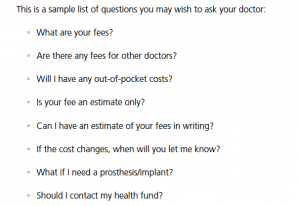The AMA’s Informed Financial Consent Guide advises specialists to talk about the likely fees a patient will face at the first consultation.
As part of the informed financial process, the guide includes a template for a financial consent form that should be filled in by specialists in partnership with patients, outlining the estimated fees and out of pocket costs for the treating doctor but also those of other health professionals such as anaesthetists, surgeons as well as pathology and imaging test fees.
“This is a major step in building health literacy – providing people with clear, easy to understand information to help them navigate the health system,” said AMA president Dr Tony Bartone.
“[But] it can only work as a collaboration between doctors and patients. It will help patients with their conversations about fees for their medical procedures. It will empower them to ask questions, the right questions. It will provide the answers to give them comfort as they go into surgery or treatment.”
The Guide, has been produced by the AMA in conjunction with the Federal government and is supported by medical professional groups including the RACP.
It provides comprehensive information on how fees are charged by doctors and the way that Medicare rebates cover some expenses, and how gap fees may arise depending on the level of insurance cover and the arrangements between doctors and insurance companies for no gap or known gap services.
To avoid ‘bill shock’ it recommends that patients ask 8 questions about fees and out of pocket costs [see box].
 The guide also states that doctors must also disclose if they have a financial interest in the facility carrying out the medical care, and also any interests in matters related to their care, such as financial gain from the use of devices.
The guide also states that doctors must also disclose if they have a financial interest in the facility carrying out the medical care, and also any interests in matters related to their care, such as financial gain from the use of devices.